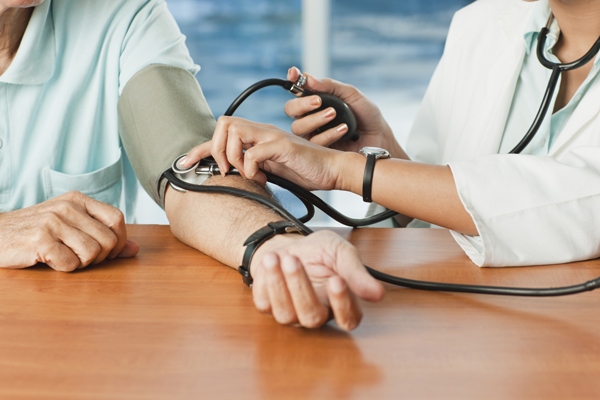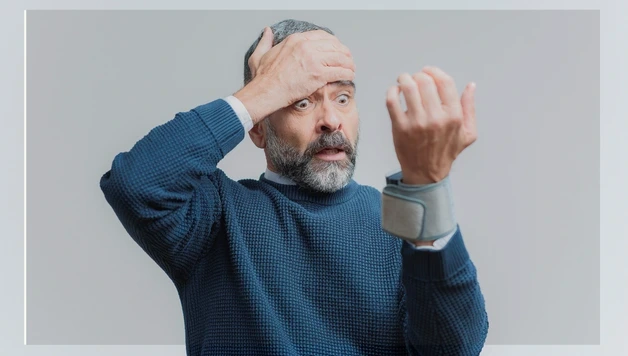The Relationship between Hot Flashes and High Blood Pressure in Men
Hot flashes are typically associated with women going through menopause, but it is also a phenomenon that can occur in men. The cause of hot flashes in men is poorly understood, but studies have suggested a link between hot flashes and high blood pressure. This article will explore the relationship between hot flashes and high blood pressure in men and what steps can be taken to manage the symptoms.
What are hot flashes?
Hot flashes are a sudden feeling of heat that spreads throughout the body, often accompanied by sweating and a rapid heartbeat. They can last anywhere from a few seconds to several minutes and occur several times a day or occasionally. Although hot flashes are commonly associated with menopause in women, they can also occur in men.
According to Harvard Health, hot flashes in men plague about 70%–80% of men who receive androgen deprivation therapy to treat prostate cancer. Low testosterone is the culprit, but scientists don’t know just how reduced sex hormone activity produces the problem. The thermal control centre in the part of the brain known as the hypothalamus appears responsible.
What is the main cause of hot flashes in men?
1. Hormonal imbalances: Men, like women, undergo hormonal changes as they age. These changes can result in hormonal imbalances, such as testosterone, which can cause hot flashes.
2. Medications: As a side effect, some medications used to treat conditions such as prostate cancer and other hormonal imbalances can cause hot flashes.
3. Medical conditions: Hot flashes in men can be caused by hyperthyroidism, diabetes, and infections.
4. Lifestyle factors: Smoking, excessive alcohol consumption, and stress are all factors that can contribute to hot flashes.
What are the signs of male hot flashes?
The signs of male hot flashes are similar to those experienced by women and can include:
- Sudden feeling of warmth or flushing in the face, neck, or chest
- Sweating, often profusely
- Rapid heartbeat or palpitations
- Chills or shivering
- Feeling anxious or irritable
- Headache or dizziness
- Difficulty sleeping
- Fatigue or weakness
What is high blood pressure?
High blood pressure, also known as hypertension, occurs when the force of blood against the walls of the arteries is consistently too high. Over time, this can damage the arteries and increase the risk of heart disease, stroke, and other health problems. High blood pressure is a common condition that affects millions of people worldwide, and it often goes unnoticed because it has no symptoms.
Why is blood pressure more common for men?

High blood pressure (hypertension) is more common in men than women, particularly in younger age groups. According to the American Heart Association, about 45% of men have high blood pressure compared to 35% of women in the United States.
Several factors contribute to this gender difference in hypertension rates. One crucial factor is that men are more likely to have certain risk factors for high blood pressure than women. For example, men are more likely to be overweight or obese, consume more sodium, and drink more alcohol than women. These factors can increase blood pressure levels and increase the risk of hypertension.
Additionally, hormonal differences between men and women may also play a role. Women have higher estrogen levels, which can help protect against high blood pressure by promoting blood vessel dilation and decreasing inflammation. After menopause, however, women’s risk for high blood pressure increases as their estrogen levels drop.
Genetics also play a role in the development of high blood pressure. Certain genetic variations are more common in men and have been linked to an increased risk of hypertension. A family history of high blood pressure is also a risk factor for both men and women. Men and women must monitor their blood pressure regularly and make healthy lifestyle choices to help prevent and manage hypertension.
The relationship between hot flashes and high blood pressure in men
The relationship between hot flashes and high blood pressure in men is not well understood, but studies have suggested that there may be a link between the two. For example, a study published in the Journal of Clinical Endocrinology and Metabolism found that men who experienced hot flashes were likelier to have high blood pressure than men who did not experience hot flashes. The study also found that the more severe the hot flashes, the higher the blood pressure readings were.
Another study published in the Journal of Urology found that men undergoing androgen deprivation therapy for prostate cancer were likelier to experience hot flashes and high blood pressure than men not. The study also found that the severity of the hot flashes was positively correlated with the severity of the high blood pressure.
The exact mechanism behind the link between hot flashes and high blood pressure in men is unclear, but researchers have suggested several possibilities. Hot flashes cause a sudden increase in blood pressure as the body tries to cool itself down. Another option is that the hormones involved in regulating blood pressure are also involved in regulating body temperature, and changes in these hormones can lead to both hot flashes and high blood pressure.
More research is needed to fully understand the relationship between hot flashes and high blood pressure in men. If you are experiencing either of these symptoms, you must speak with your healthcare provider to determine the underlying cause and develop an appropriate treatment plan.
Managing hot flashes for men

Hot flashes in men can be uncomfortable and disruptive, but several strategies can help manage the symptoms. Here are some tips for managing hot flashes in men:
- For men experiencing hot flashes as a result of low testosterone levels, testosterone replacement therapy may be recommended. This therapy can help alleviate hot flashes and other symptoms associated with low testosterone levels but may also increase the risk of high blood pressure. Therefore, regular blood pressure monitoring is important for men undergoing this therapy.
- For men experiencing hot flashes due to androgen deprivation therapy for prostate cancer, several medications may be used to manage the symptoms, including antidepressants and anticonvulsants. Lifestyle changes, such as avoiding hot and spicy foods, caffeine, and alcohol, may also help alleviate hot flashes.
- Identify and avoid triggers: Pay attention to the situations or activities that seem to trigger hot flashes and try to avoid them as much as possible. Common triggers include spicy foods, caffeine, alcohol, stress, and hot temperatures.
- Dress in layers: Wear loose, breathable clothing made of natural fibres like cotton or linen. Dress in layers to easily remove clothing when you feel a hot flash coming on.
- Keep cool: Use fans or air conditioning to keep the room temperature cool. Use a cooling towel or cold pack to help lower your body temperature during a hot flash.
- Practice relaxation techniques: Stress and anxiety can trigger hot flashes, so practising relaxation techniques like deep breathing, meditation, or yoga may help reduce the frequency and severity of hot flashes.
- Exercise regularly: Regular exercise can help regulate body temperature and reduce the frequency and severity of hot flashes. Aim for at least 30 minutes of moderate-intensity exercise, such as brisk walking or cycling, most days of the week.
- Consider hormone therapy: If low testosterone levels cause hot flashes, testosterone replacement therapy may be recommended. However, hormone therapy can have risks and side effects, so discussing the pros and cons with your healthcare provider is essential.
- Try alternative therapies: Some men find relief from hot flashes with treatments such as acupuncture, herbal supplements, or hypnosis. However, it is important to discuss these options with your healthcare provider and do your research to ensure they are safe and effective.
How long do hot flashes last in men
Managing high blood pressure for men
Managing high blood pressure (hypertension) is important to reduce the risk of heart disease, stroke, and other health complications. Here are some tips for controlling high blood pressure in men:
- Monitor your blood pressure regularly: Get your blood pressure checked regularly by your healthcare provider, and monitor it at home with a blood pressure monitor. Keeping track of your blood pressure can help you and your healthcare provider determine if your treatment plan works.
- Adopt a healthy diet: Eating a diet rich in fruits, vegetables, whole grains, lean proteins, and low-fat dairy products can help lower blood pressure. Avoid or limit foods high in sodium, saturated fats, and added sugars, which can raise blood pressure.
- Exercise regularly: Regular physical activity can help lower blood pressure and improve overall health. Aim for at least 150 minutes of moderate-intensity aerobic exercise each week, such as brisk walking, cycling, or swimming.
- Maintain a healthy weight: Being overweight or obese can increase blood pressure. Losing even a small amount of weight can help lower blood pressure and reduce the risk of other health complications.
- Limit alcohol intake: Drinking too much alcohol can raise blood pressure. Men should limit alcohol intake to no more than two drinks per day.
- Quit smoking: Smoking can damage blood vessels and increase blood pressure. Quitting smoking can improve overall health and reduce the risk of heart disease and other health complications.
- Manage stress: Chronic stress can raise blood pressure. Finding ways to manage stress, such as through exercise, meditation, or hobbies, can help lower blood pressure and improve overall well-being.
- Take medication as prescribed: If lifestyle changes alone are insufficient to lower blood pressure, your healthcare provider may prescribe medication. Taking medicines as prescribed and talking to your healthcare provider about any side effects or concerns is crucial.
Conclusion
Hot flashes are a common symptom experienced by men, and there may be a link between hot flashes and high blood pressure. While the exact mechanism behind this is yet to be understood and explored through research, by taking a proactive approach to managing both high blood pressure and hot flashes, men can reduce the frequency and severity of hot flashes and reduce the risk of heart disease, stroke, and other health complications and improve their quality of life.









